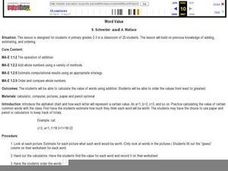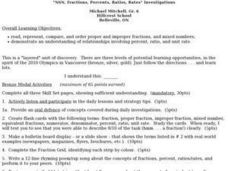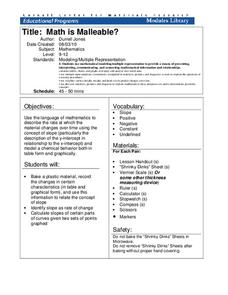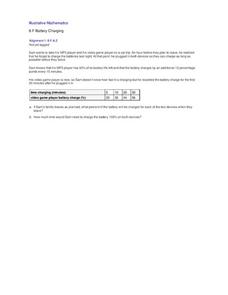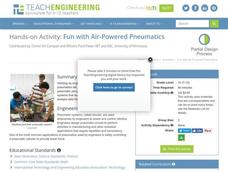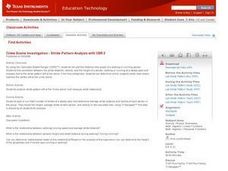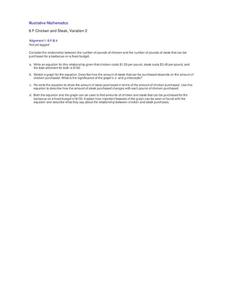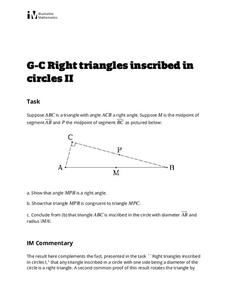Curated OER
Number Sentences
Fifth graders become familiar with problem solving strategies of guess and check and working backwards. They demonstrate the basic concepts of addition, subtraction, multiplication, and division using a math sentence.
Curated OER
Word Value
Students investigate the concepts of adding, estimating, and ordering. The lesson uses the alphabet as an example illustration. The students practice the calculations in class in order to ensure mastery.
Curated OER
Searching for Angles and Lines
Middle schoolers work to find and reinforce concepts related to lines and angles. They identify the characteristics of shapes that have one, two, and three dimensions. The students also work on definitions related to the geometry of shapes.
Curated OER
How Many?
Learners investigate concepts related to data collection and interpretation. They generate all possible outcomes in a beginning study in the realm of statistics. The use of real life situations helps to engage students.
Curated OER
Does Sunlight Effect Leaf Size?
Students make estimates and then measure leaves for accuracy. They calculate the area of the leaves by drawing an outline on graph paper and counting the squares. They compare the leaves exposed to sunlight to those that are in constant...
Curated OER
Symmetry and Geometric Shapes on Campus
Build on your learners' previous knowledge of geometric shapes and symmetrical figures. Then set them out to take photos of geometric shapes on campus. They assess whether the photos contain symmetry or not.
Curated OER
Workshop Lesson: Digital Camera
Learners perform an activity in small groups in order to investigate different types of shapes found in photographs taken with a digital camera. The integration of technology is used to engage students in the lesson.
Curated OER
"NSN, Fractions, Percents, Ratios, Rates" Investigations
Sixth graders engage in an investigation about the concepts related to fractions. They read, represent, compare, and order proper and improper fractions, and mixed numbers. They demonstrate an understanding of relationships involving...
Curated OER
Introduction to Graphs
Students poll classmates to gather information for a graph. They identify three types of graphs (bar, line, table). Students create each type of graph using data gathered from classmates.
Cornell University
Math Is Malleable?
Learn about polymers while playing with shrinky dinks. Young scholars create a shrinky dink design, bake it, and then record the area, volume, and thickness over time. They model the data using a graph and highlight the key features of...
Illustrative Mathematics
Equal Area Triangles on the Same Base II
A deceptively simple question setup leads to a number of attack methods and a surprisingly sophisticated solution set in this open-ended problem. Young geometers of different strengths can go about defining the solutions graphically,...
Laboratory for Atmospheric and Space Physics
Growing Up With A Mission
New Horizons began its journey to Pluto in 2006. Ten years later, it continues its mission. In that time, scholars have surely grown, but how much more will they grow by the time New Horizons reaches its destination? Find out with an...
Kenan Fellows
Math Made Simple as 1-2-3: Simplified Educational Approach to Algebra
Writing an equation of a line is as easy as m and b. A lesson presentation gives individuals different strategies for writing equations of lines. Some items provide a slope and a point while others provide two points. Whatever the given,...
Illustrative Mathematics
Battery Charging
Your class will be very interested in the results of this activity. How long does it take a MP3 and video game player to charge? Sam only has an hour and the MP3 player only has 40% of its battery life left. Plus, his video player...
Illustrative Mathematics
How Many Cells Are in the Human Body?
Investigating the large numbers of science is the task in a simple but deep activity. Given a one-sentence problem set-up and some basic assumptions, the class sets off on an open-ended investigation that really gives some...
Teach Engineering
Fun with Bernoulli
Reduce the pressure in the classroom. The second instructional activity in an Airplanes unit of 22 introduces the class to Bernoulli's Principle. Pupils demonstrate the principle by blowing between different objects causing a reduction...
Teach Engineering
Fun with Air-Powered Pneumatics
How high did the ball go? Engineering teams build a working pneumatic system that launches a ball into the air. The teams vary the amount of pressure and determine the accompanying height of the ball. An extension of building a device to...
Laboratory for Atmospheric and Space Physics
Planetary Distances on the Playground
There's no need to stay inside; get out of the classroom and create a scaled map of the solar system on your playground field! In collaborative groups, scholars identify the distance between the sun and other planets, place planet...
Code.org
Controlling Memory with Variables
Not all variables are created equal. Discover how variables in computer science are different from variables in math class. Scholars learn to work with variables in computer programming by developing a mental model for how variables...
Virginia Department of Education
Logic and Conditional Statements
If there is a conditional statement, then there is a hypothesis and conclusion. Pupils learn how to identify the parts of conditional statements. Class members continue to work with conditional statements and rewrite them in their many...
Texas Instruments
Vandalism 101
Learners explore logic and use Geometer’s Sketchpad and patterns of logic to solve a puzzle.
Illustrative Mathematics
Chicken and Steak, Variation 2
Many organizations put on barbecues in order to make money. In a real-world math problem, the money allotted to purchase steak and chicken at this barbecue is only one hundred dollars. It is up to your potential chefs to figure out how...
Illustrative Mathematics
Planes and Wheat
Understanding government spending is difficult. The number of variables can be enormous. In the corresponding resource, number crunchers are given one equation related to government spending with a number of variables. Your class is...
Illustrative Mathematics
Right Triangles Inscribed in Circles II
So many times the characteristics of triangles are presented as a vocabulary-type of lesson, but in this activity they are key to unraveling a proof. A unique attack on proving that an inscribed angle that subtends a diameter must be a...
Other popular searches
- History of Mathematics
- Discrete Mathematics
- Mathematics Line Symmetry
- Everyday Mathematics
- Montessori Mathematics
- Writing in Mathematics
- Mathematics Mode and Median
- Applied Mathematics
- Mathematics Times Tables
- Christmas Mathematics
- B Ed Mathematics
- Discrete Mathematics Graph

